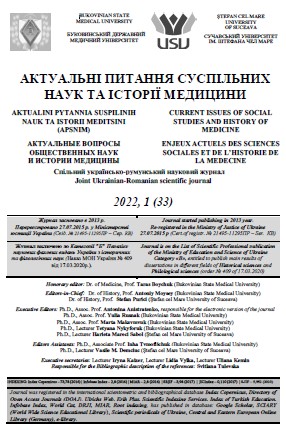СЕМАНТИЧНІ ОСОБЛИВОСТІ ПІДМЕТІВ-СЛОВОСПОЛУЧЕНЬ З КІЛЬКІСНИМ ЗНАЧЕННЯМ
SEMANTIC FEATURES OF SUBJECTS-WORD PHRASES WITH QUANTITATIVE MEANING
Author(s): Оksana MaksymiukSubject(s): Semantics, Eastern Slavic Languages, Phraseology
Published by: Видавництво ВДНЗ України « Буковинський державний медичний університет »
Keywords: syntactically indivisible phrases; semantically indivisible phrases; subject-phrases with quantitative meaning; numerator nouns; sema totality; synsemantic nouns;
Summary/Abstract: The article is devoted to the problem of syntactic connection of words and indecomposable components in the sentence structure. The aim of the research is to characterize the semantic features of subjects expressed by syntactically indivisible phrases with quantitative meaning, as they are most represented in the modern Ukrainian language among syntactically indivisible phrases. The scientific novelty of the study is that the conditions and factors of formation of indecomposable components with quantitative are analyzed and their semantic analysis is carried out. The urgency of scientific research is due to the need for comprehensive analysis of semantic features of subject-phrases with quantitative ones meaning in the modern Ukrainian language. Methods and techniques. Methods were used to solve the tasks component and unctional analysis of syntactic units. Conclusions. We can conclude that syntac-syntactically indivisible phrases with quantitative meaning that play the role of subjects in the modern Ukrainian language are diverse in their semantics (there are seven groups: 1) combination of numeral nouns with nouns in the genitive case; 2) subject phrases with nouns to denote a specific or approximate measure and nouns in the genitive case; 3) subject-phrases with synsemasynsemantic nouns with the general meaning of excessively large or extremely small number and nouns in the genitive case; 4) objects expressed by combining nouns that have the meaning of totality of living beings, with nouns in the genitive case; 5) subjects expressed by a combination of nouns, which are characterized by the sema of the set to denote an indefinite number of objects, with nouns in the genitive case; 6) subject-phrases with nouns that have the meaning of measure (quantitative volume in the form of the subject) and nouns in the genitive case; 7) subjects expressed by combining nouns with quantitative meaning to denote administrative units united in a certain totality, and nouns in the genitive case) and should be considered as one member of the sentence, because their dismemberment often leads to violation of semantic and grammatical integrity.
Journal: Актуальні питання суспільних наук та історії медицини
- Issue Year: 2022
- Issue No: 1
- Page Range: 79-84
- Page Count: 6
- Language: Ukrainian

